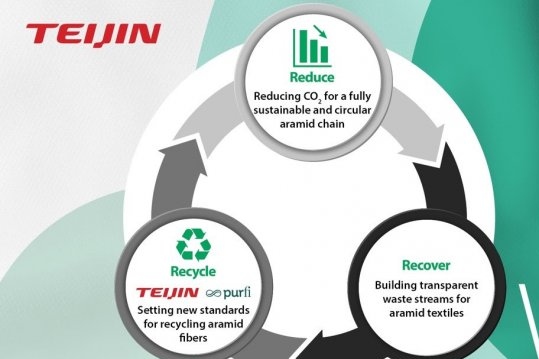
Teijin Aramid to highlight its new circularity collaboration with Purfi
YarnsandFibers News Bureau 2021-10-26 09:38:51 – GermanyTeijin Aramid will showcase its high-performance aramid solutions for protective materials, such as Teijinconex, at the International A+A Congress from October 26-29 in Düsseldorf, Germany, in addition to highlighting its new circularity relationship with Purfi.
Purfi, based in Waragem, Belgium, is a joint venture between Concordia Textiles and Purfi Global that focuses on the strategic categorization and classification of textile fabric waste, as well as the subsequent processing of these materials using patented and trade secret protected machinery and process techniques. Traditional recycling, on the other hand, usually involves the aggressive mechanical tearing, resulting in primarily downcycled end-products, or caustic chemicals and high resource expenditures, resulting in an expensive end-product.
Purfi claims that its rejuvenation process turns post-industrial textile waste into completely sustainable circular fibers with a minimal carbon footprint. It can also trace raw components from the manufacturer to the Purfi rejuvenation facility's finished product. Its partnership with Teijin Aramid is based on a technique that regenerates pre-and post-consumer aramid-based materials used in protective textiles to an extraordinarily high standard at the fiber level. Teijin Aramid and its value chain partners hope to utilize the regenerated fibers in the creation of aramid-based protective fabrics.
Another goal is to establish circularity in the aramid chain for Teijinconex-based goods while reducing waste and using virgin materials as little as possible. The partnership is driven by three main goals: reducing carbon emissions, establishing new standards for recycling all aramid fibres, and building transparent material streams for aramid textiles.
Teijin Aramid, based in Arnhem, the Netherlands, aspires to create a fully circular aramid value chain with no emissions. The company has been developing recycling methods to handle waste problems in a variety of industries for over 20 years and has been mechanically recycling end-of-life products into pulp, which may be used to make usable products like brake pads.
Jan Roos, the company’s director of sustainability, said that all aramids, especially aramids used in protective equipment, ought to be in the loop over and over again. Their goal is to become the world's best aramid firm. To do so, they must first become fully circular, which necessitates collaboration with supply chain partners and the exploration of appropriate recycling ways while retaining product performance. They're pleased to take this next step in their protective apparel relationship with Purfi.
TeijinConex, Twaron, and Technora from Teijin Aramid are known for their strength, durability, safety, heat resistance, and low weight, and are utilized in a variety of markets and segments, including automotive, safety and life protection, aerospace, and a wide range of industrial applications. These are made in the Netherlands, Thailand, and Japan, respectively.
Market Intelligence
Ask for free sample Report

experience
Customer Base
dedicated team
Countries Served Worldwide









